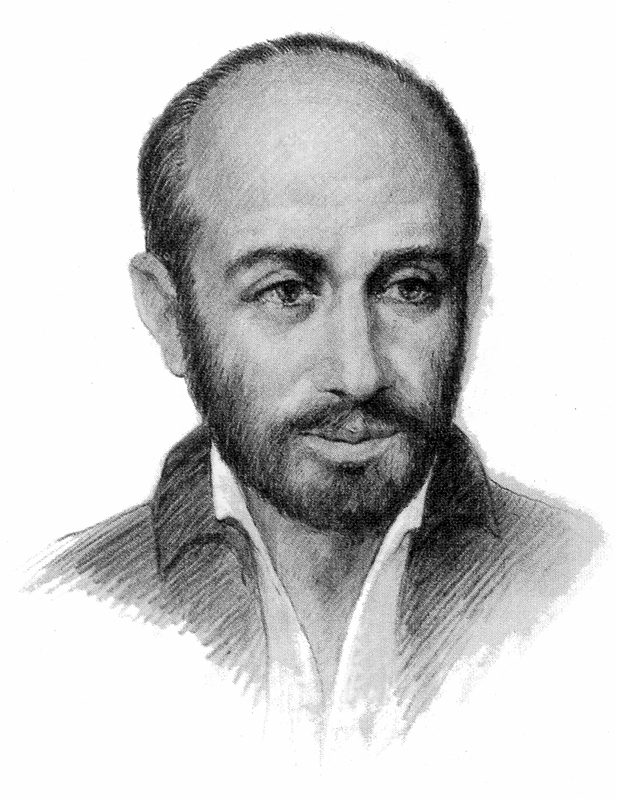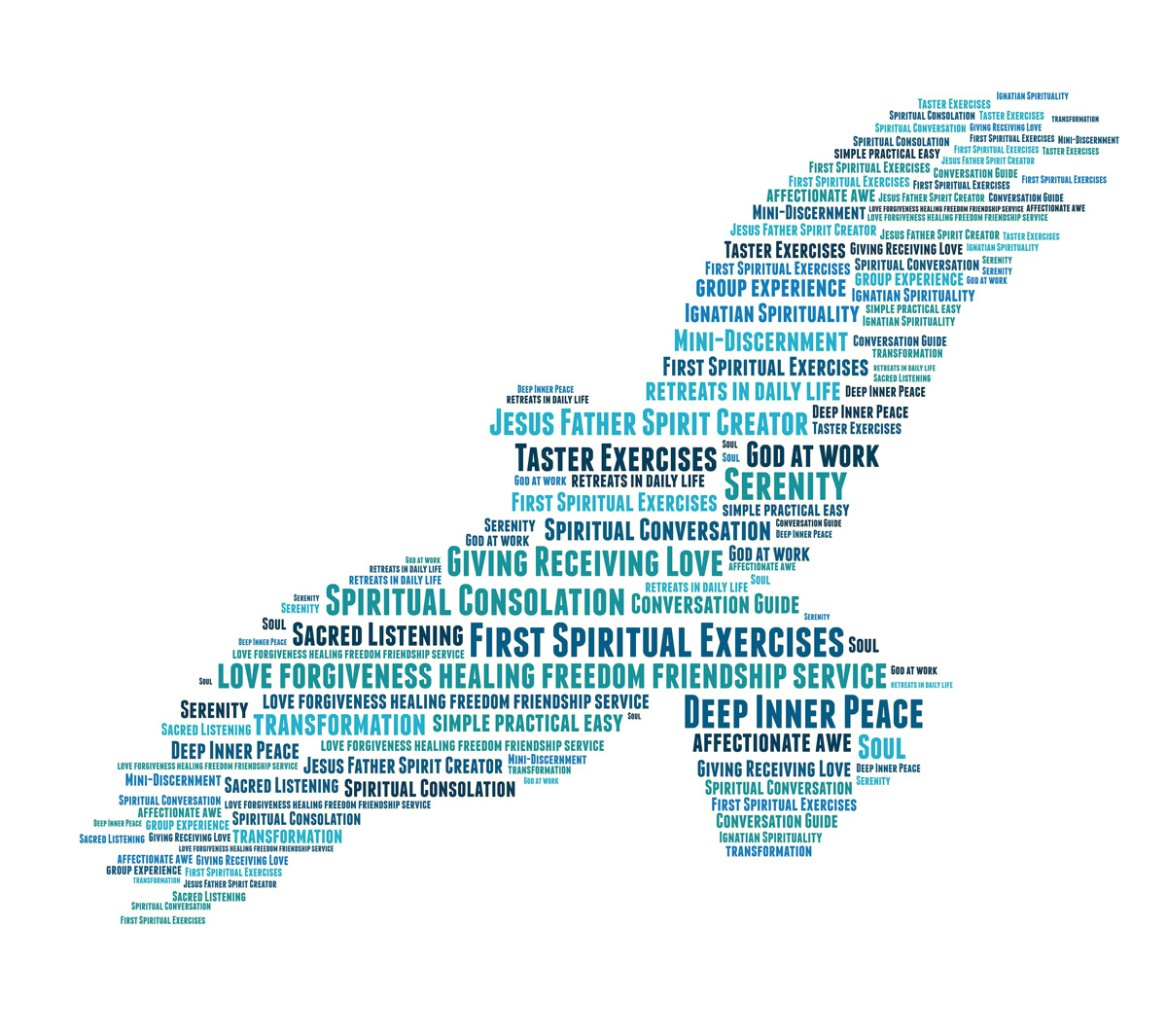The First Spiritual Exercises of Ignatius Loyola

It all began in 1521, at Loyola, a fortified tower in the Basque country. Ignatius reads and day dreams during months of recuperation from a near fatal war wound. It becomes a time of conversion, he desires to give everything away, go to Jerusalem as a penitent pilgrim, and imitate the great saints of the desert. In this time, he wonders at the spirits moving in him, and gives himself over to spiritual conversations with his family.
The next year he sets off to the Black Madonna in the mountains of Montserrat where he spends all night in prayer and conversation with the Black Madonna, offering his sword like a knight, to become her knight of God. The monks give him a small book of exercises to help prepare for his confession.
He walks down to Manresa, where he experiences great trials and mystical graces. God teaches him about prayer, good and bad spirits, scruples, true desires, creation and much else. He writes his own spiritual exercises and discovers that what helps him can help others. He says people wanted to talk to him, because even though he had no knowledge of spiritual matters, yet in his speech he revealed great fervour and eagerness to go forward in God’s service. So begins the great Ignatian connection between personal relationship, spiritual conversation, and spiritual exercise. Here the seeds of a life for others are sown.

After this, Ignatius sails to Jerusalem but cannot stay, so returns to Barcelona learning Latin for future study. Polanco, an early Jesuit, says during this time he did not stop helping many people by the example of his conversations and spiritual exercises.
This continued at Alcalá and Salamanca during his university studies. His conversations attracted the Inquisition, who twice put him in jail, but judged him innocent. He gave exercises from what he now called his little book of Spiritual Exercises, to a noble woman and her daughter, to a baker and his wife, to a hospital orderly, to university professors and students. Young or old, educated or illiterate, poor or rich, Ignatius felt the FSE was for all.
He then starts serious studies at the University of Paris. After a year, he also began to give himself more intensively to spiritual conversations than he normally did, and he gave exercises to three people. At once the three gave all they had to the poor, even their books, and began begging in the Paris streets. This caused great commotion at the university and strictures by the authorities. Later a teacher remarked to Ignatius his surprise that no one was causing him trouble anymore. Ignatius answered, the reason is because I’m not talking to anyone about the things of God. But when the course is over we’ll be back to normal! His passion for this simple spiritual engagement with others grew like a field of wildflowers.

At this time, Ignatius gave the Spiritual Exercises in a longer form than the FSE, intensively over many months, to his college roommates, Francis Xavier and Pierre Favre. This form of the Spiritual Exercises had new exercises on how to make a good decision, and the life, death and resurrection of Jesus. Through conversations and regular enjoyable meals, this group of three became a group of seven companions, who all desired to go to Jerusalem and live as actual apostles.
Arriving in Venice, Ignatius busied himself giving the Exercises and in other spiritual contacts. The now nine companions joined him later and while they all waited for a ship, they begged and served in the hospitals. After most were ordained, they went out into the towns, to beg for food, preach on street corners, and engage in spiritual conversations.
When their Jerusalem plans were ended by war, they returned to Rome to offer themselves to the Pope. In the end, they became a new religious order, the Society of Jesus. In a foundational document for the Pope, they describe their purpose. Not surprisingly, spiritual conversation and giving exercises stand proud in the short list, for they had not only helped so many people but also made them who they were. Here the vine is planted. Here the fruitful branches of the Exercises grow out.

Ignatius writes later, endeavour to be profitable to individuals by spiritual conversations, by counselling and exhorting to good works, and by conducting spiritual exercises. And also that, the exercises of the first week can be made available to large numbers; and some examinations of conscience and methods of prayer can also be given far more widely, for anyone who has good will seems to be capable of these exercises.
The date is now 1548, the Pope has approved the Spiritual Exercises, and they are printed. In this book were complete instructions and material for giving the Spiritual Exercises in its two full forms, thirty days enclosed from normal life, and thirty weeks in daily life. The book also included instructions for the FSE, given for four weeks in daily life. So there is one book, but three forms of giving the Exercises, which use all or part of the exercises within. Ignatius also includes ways to apply the exercises to different people, their desires and life situations. For each new group of receivers the FSE is a different spice, adding colour, texture and taste to spiritual lives.

Both the Spiritual Exercises and the First Spiritual Exercises are now taken out into Europe and the new world, the FSE being given to greater and greater numbers of people. The early Jesuits record this. Nadal says how different parts of the Spiritual Exercises helped different people with different needs.
Polanco insists the Spiritual Exercises were intended for every class of society, and in fact had helped every class, in ways that preaching, exhortation, and fear of damnation did not.
Ignatius writes that the FSE can be extended to large numbers of persons, including women and married ladies. Domenech gives the FSE to orphan boys in Messina. Broet often gave them to young women in Bologna and Landini gave them to priests and young women.
Favre saw the FSE ripple through Palma and out into the countryside, as lay and church people received them, then they enthusiastically gave them to others, and these receivers in turn gave them to more others. So the seed head of the FSE releases seeds on the breath of God, to wherever the Spirit wishes to work.

One pastoral strategy in a new city seems to have been to give the FSE, then form a lay sodality or confraternity, whose rule of life was a way to live out the exact exercises they had learned, and been given the graces desired within them. These sodalities, involving huge numbers, spread like wild fire throughout Europe and today, 450 years later, they continue as the worldwide Christian Life Community.
The preached Spiritual Exercises, annual retreats for religious, exercises for faith formation, renewal programs, detailed retreat books applying the Exercises to particular groups, flourished in city after city. Ignatian directories for eight day retreats, drama, music, street processions, art and architecture drew on the spirituality of the Spiritual Exercises. Devotional books, translations into many languages, engraved gospel contemplations, visual exercises and best selling spirituality books have been published in hundreds of books.
In the last fifty years, the Spiritual Exercises has seen a new growth of individual spiritual direction for the Spiritual Exercises, with lay people receiving and giving them, and new forms of street, youth and guided retreats in daily life have been given.
Now the First Spiritual Exercises is taking flight again.

Jesuit international meetings in 1890 and 1920 vigorously supported to the greatest extent possible giving the FSE to men, ecclesiastics, the workers and the poor. So too, they encouraged forming sodalities for students, young people, workers, and the poor. Both works, in turn, were to imbue an interior spirit of the Christian life, strengthen in solid virtue, train in love and the works of mercy, and inflame with zeal for souls.
Today the Spiritual Exercises are promoted as a source of similar inspiration, so that our deep love of God and our passion for his world should set us on fire, a fire that starts other fires.
